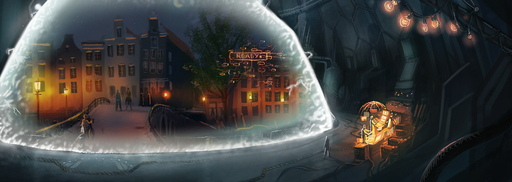Category: Strategy

Time travel artwork done by David Revoy for the preproduction of the fourth open movie of the Blender Foundation ‘Tears of Steel’
My post Time Travel To Success, about success strategy, appeared recently on Jim Pagiamtzis’s blog Get Connected 21st Century. It is different from the standard work-hard-and-think-positive-thoughts stuff.
You can read it by clicking here.
We hear so many stories of risks paying off that we’re in danger of thinking that the greater the risk, the greater the reward. But if that were so most gamblers would leave Las Vegas with more than when they arrived.
Psychology Of Risk Assessment
Human beings are not computers. We tend to assess risks less accurately than what you would get from a simple set of rules.
We often pay more attention to anecdotes and memories of risks succeeding or failing than to rational analysis. If we vividly remember risk leading to disaster we are more likely to refuse risks we should take. If we vividly remember risk paying off we are more likely to take risks we should refuse.
The best way is to assess risks with a rational balance between risk and reward. How likely is failure or success? What harm or benefit would result?
This might seem to dull and actuarial for those of us who thrill to the stories of the great captains of war and industry. What would General Patton think of us?
Calculated Risk In War
Patton and Tanks
Was General George S. Patton a rash risk-taker? That was his reputation while fighting World War II.
His superiors kept holding him back, partly because they thought he was too rash. But was he really?
Military historians agree that his ideas were right. He could have ended the war earlier if fully unleashed. So was he making lucky guesses?
No. Despite his rash, rough, aggressive image, he was an experienced and expert military man. During World War I he founded a tank school for the Americans and used tanks in combat. As of World War II he was one of the world’s leading tank experts. His correct calculation was that with reconnaissance and combat support from the air, his tanks were at little risk from being flanked.
So aggressive advances were the right way to go.
He was not a wild risk-taker. He was a calculated risk-taker.
Sherman and the March to the Sea
The same goes for William Tecumseh Sherman’s famous March to the Sea. Sherman led his army away from its normal sources of reinforcement and supply and marched away into Georgia.
Would southern armies, fighting for their home ground, have a great advantage in morale and knowledge of the terrain? Unable to get reinforcements during the march, would his army shrink excessively from disease and combat losses? Above all, would his army starve?
Both President Lincoln and General Grant had serious doubts about Sherman’s plan. President Lincoln later wrote to Sherman:
When you were leaving Atlanta for the Atlantic coast, I was anxious, if not fearful; but feeling that you were the better judge, and remembering that ‘nothing risked, nothing gained’ I did not interfere. Now, the undertaking being a success, the honour is all yours; for I believe none of us went farther than to acquiesce.
So was Sherman just a lucky gambler? No.
He knew that the march would help greatly in ending the war, if it succeeded.
As for the chances of success, from having lived in the south and his diligent study of southern agriculture, he knew his army could forage enough to support itself on the march. He also helped his chances by keeping the enemy in doubt about his immediate goals.
His radical move was a carefully calculated risk.
Calculated Risk In Business
Despite books pushing the analogy between them, business is very different from war. Still, the history of risk in war suggests points to consider for business risk:
- How big is the potential gain?
- How big is the potential loss?
- Would the possible loss be manageable, or fatal?
- Is the risk really necessary?
- What is the risk of not taking the risk?
- Is there a safer way? A cheaper way? A better way?
- Have you considered that you never know everything?
- Are the necessary people and resources available?
- Would your people understand the plan, and follow it?
- Have the chances of success been rationally calculated or is it based on feelings? Greed, ego, and optimism can lead you astray.
With a carefully calculated balance of risk and reward the business or the military has a better chance to win, and win big. Then the media will talk up the risks taken and downplay the calculations that led to victory.


